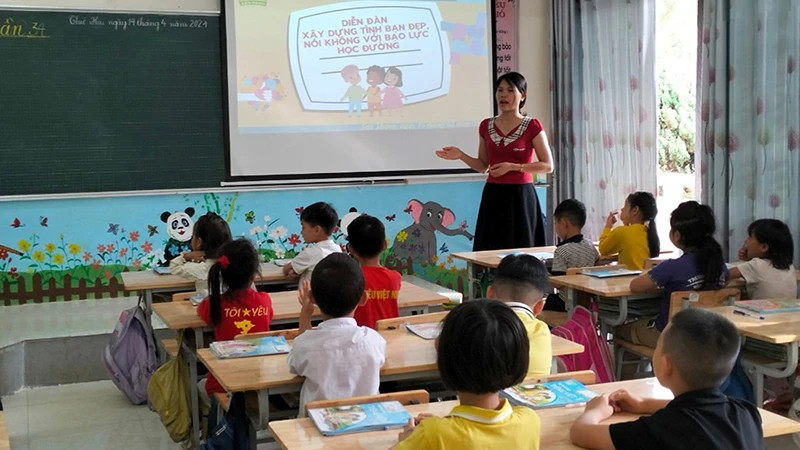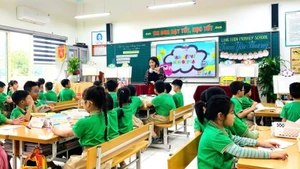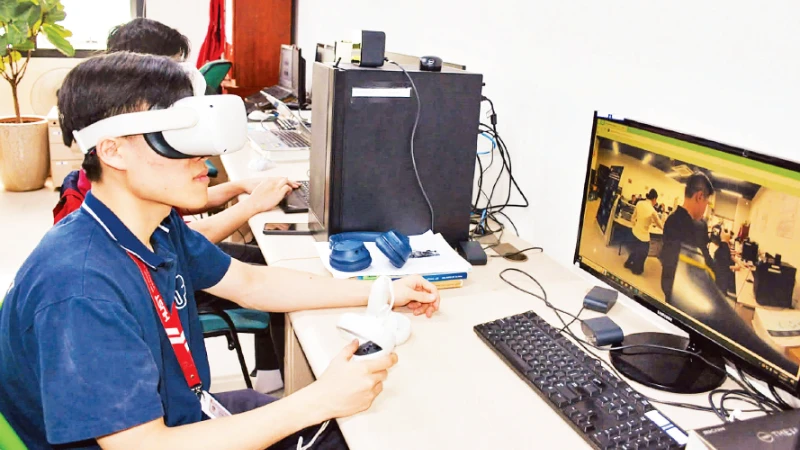According to the Head of the Department of Political Education and Student Affairs under the Ministry of Education and Training, Tran Van Dat, the country currently has over 23 million students studying at 44,000 schools from kindergarten to university and more than 1.4 million teachers and lecturers at all levels.
Therefore, it is very necessary to develop a code of conduct and organise cultural activities to gradually build a cultural environment for schools, creating a safe, healthy and friendly educational environment.
In recent years, the work of directing and organising the implementation of building school culture in general, and behavioral culture among cadres, teachers, staff and students in educational institutions in particular, has had many positive results. Most students are aware of promoting national pride and self-respect, respecting good traditional cultural values in schools, and actively cultivating and practising manners, communication and behaviour following social standards.
School managers, teachers and staff strictly comply with the policies, guidelines, and laws of the Party and the State, regulations of the industry, locality and school, being exemplary, and having standard attitudes, communication and behaviour.
In its role as a state manager, the Ministry of Education and Training has focused on directing and considering the task of building school culture as a core value in comprehensive education for students, issuing documents directing the implementation of building school culture, behavioural culture, organising cultural, artistic and aesthetic education activities for teachers and learners to build a safe, friendly and healthy pedagogical and educational environment.
Many general education institutions and universities have proactively built and implemented the construction of a school culture environment, and cultural codes of conduct in schools associated with university governance. At the same time, building the brand and reputation of the school in society.
The representative of the Vietnam Education Trade Union said that the building of a culture of behaviour has been of interest to the Ministry of Education and Training and the Vietnam Education Trade Union for many years now and in many forms, such as the campaign "Democracy - Discipline - Love - Responsibility", "Each teacher is an example of morality, self-study and creativity". The emulation movement "Building friendly schools, active students" has been actively responded to and implemented by the team of managers and teachers in the industry.
These solutions have brought about certain results. The teaching staff has positive changes in awareness and action, solidarity, love for the profession, and love for colleagues and students. Many teachers are truly role models for students to follow.
In addition, a healthy school culture helps members share experiences and knowledge, developing the ability to cooperate among members in all areas of school activities.
Thereby, creating a favourable environment, trust, and mutual respect, improving the quality of teaching and learning, actively working for the common development of the school, and contributing to the common development of the education sector and society.
However, building school culture in the current context is facing many difficulties and challenges such as the impacts of the development of society, information technology with the internet and social networks increasingly developing, the standard values, and cultural lifestyle of students and university students have certain changes, from awareness, attitude, to behaviour and conduct.
In reality, the manifestation of school culture is a prominent current issue not only in schools but also in the whole society, with some incidents that have caused public outrage. In addition, propaganda, dissemination, education of knowledge, and cultural standards of behaviour for managers, teachers, staff, students and university students have not received due attention, and are still heavily formalistic.
The coordination between schools, families and society, especially for political and social organisations in schools, is not tight and synchronous. There are still some managers, teachers and staff in educational institutions, who do not follow standards in communication and behaviour, in performing their duties, and in their ethics as teachers, which affects the reputation and position of teachers and the education sector.
According to education experts, to improve the effectiveness of building a cultural environment and cultural behaviour in schools, it is necessary to implement many synchronous solutions.
In particular, it is necessary to strengthen the coordination between schools, families and society in organising cultural activities to improve spiritual life and foster moral values and positive lifestyles for students.
Educational institutions must implement school culture teaching content in integrated or interwoven forms with other teachings or school educational activities to educate students about ethics and lifestyles.
In addition, educational institutions build information systems and internal information portals to help connect students, teachers and parents, reward good behaviour and student efforts, and promote building an orderly and effective school culture.
















